Zara Case Study: Ethics, Sustainability, and Global Warming Analysis
VerifiedAdded on 2023/05/31
|17
|4212
|466
Case Study
AI Summary
This case study analyzes the ethical and sustainability issues within Zara's fast fashion model, focusing on its impact on global warming. The analysis covers environmental concerns like pollution and global warming, as well as social issues such as labor costs, child labor, CSR, long working hours, and poor payments. Recommendations are provided at both global and local levels, addressing implications for governments, producers, and consumers. Key strategies include waste management, embracing sustainability and energy management systems, educating and creating awareness, and encouraging reusing and recycling to mitigate the negative impacts of the fast fashion industry.
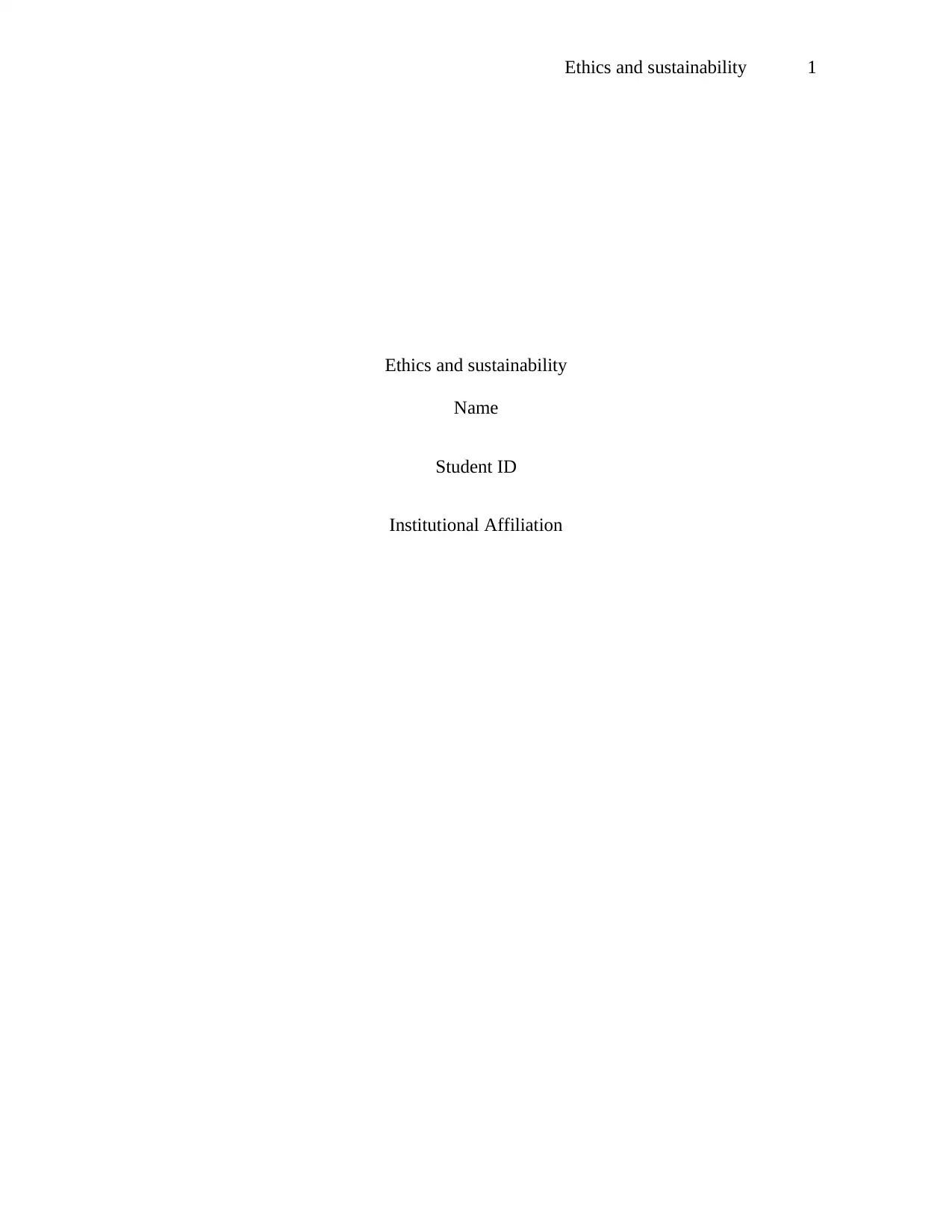
Ethics and sustainability 1
Ethics and sustainability
Name
Student ID
Institutional Affiliation
Ethics and sustainability
Name
Student ID
Institutional Affiliation
Paraphrase This Document
Need a fresh take? Get an instant paraphrase of this document with our AI Paraphraser
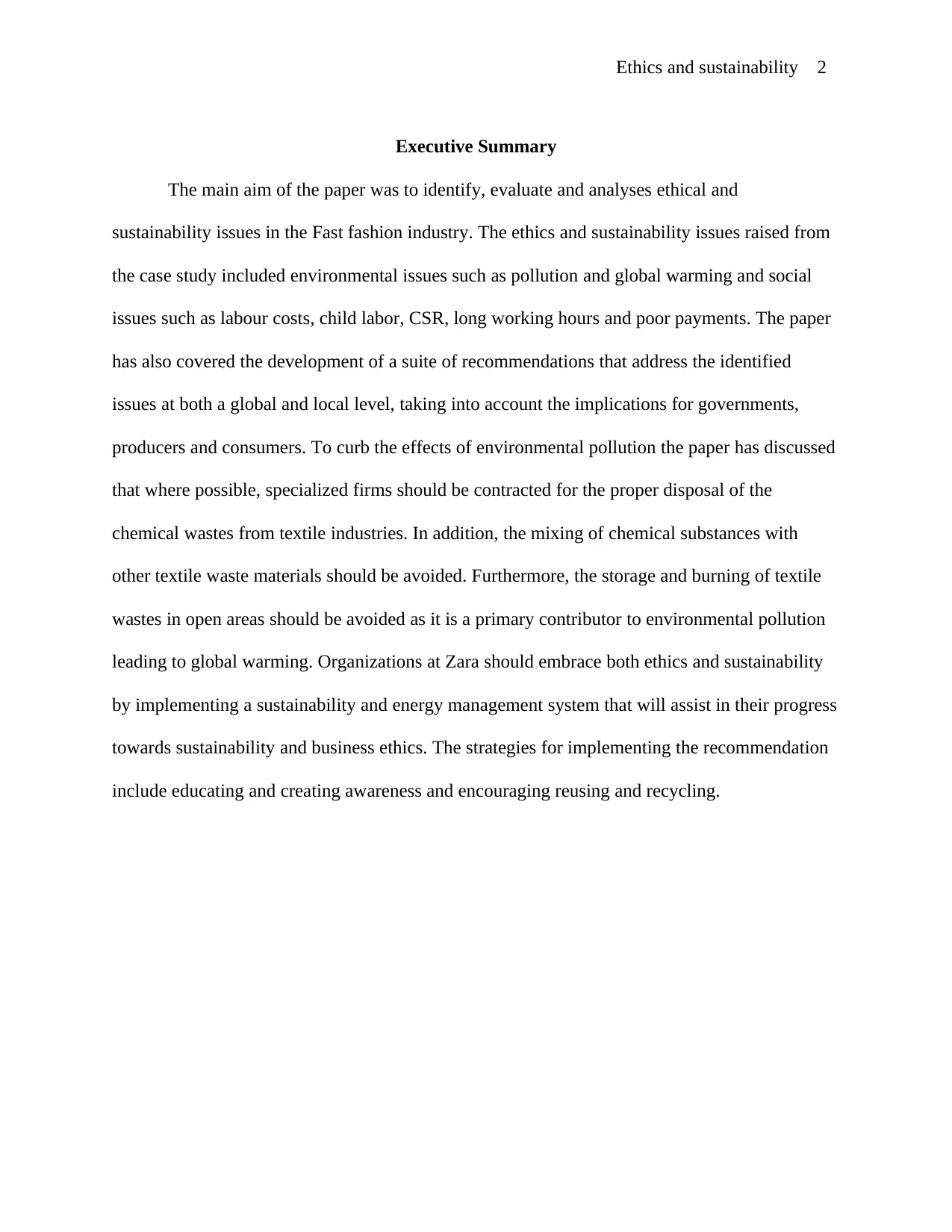
Ethics and sustainability 2
Executive Summary
The main aim of the paper was to identify, evaluate and analyses ethical and
sustainability issues in the Fast fashion industry. The ethics and sustainability issues raised from
the case study included environmental issues such as pollution and global warming and social
issues such as labour costs, child labor, CSR, long working hours and poor payments. The paper
has also covered the development of a suite of recommendations that address the identified
issues at both a global and local level, taking into account the implications for governments,
producers and consumers. To curb the effects of environmental pollution the paper has discussed
that where possible, specialized firms should be contracted for the proper disposal of the
chemical wastes from textile industries. In addition, the mixing of chemical substances with
other textile waste materials should be avoided. Furthermore, the storage and burning of textile
wastes in open areas should be avoided as it is a primary contributor to environmental pollution
leading to global warming. Organizations at Zara should embrace both ethics and sustainability
by implementing a sustainability and energy management system that will assist in their progress
towards sustainability and business ethics. The strategies for implementing the recommendation
include educating and creating awareness and encouraging reusing and recycling.
Executive Summary
The main aim of the paper was to identify, evaluate and analyses ethical and
sustainability issues in the Fast fashion industry. The ethics and sustainability issues raised from
the case study included environmental issues such as pollution and global warming and social
issues such as labour costs, child labor, CSR, long working hours and poor payments. The paper
has also covered the development of a suite of recommendations that address the identified
issues at both a global and local level, taking into account the implications for governments,
producers and consumers. To curb the effects of environmental pollution the paper has discussed
that where possible, specialized firms should be contracted for the proper disposal of the
chemical wastes from textile industries. In addition, the mixing of chemical substances with
other textile waste materials should be avoided. Furthermore, the storage and burning of textile
wastes in open areas should be avoided as it is a primary contributor to environmental pollution
leading to global warming. Organizations at Zara should embrace both ethics and sustainability
by implementing a sustainability and energy management system that will assist in their progress
towards sustainability and business ethics. The strategies for implementing the recommendation
include educating and creating awareness and encouraging reusing and recycling.
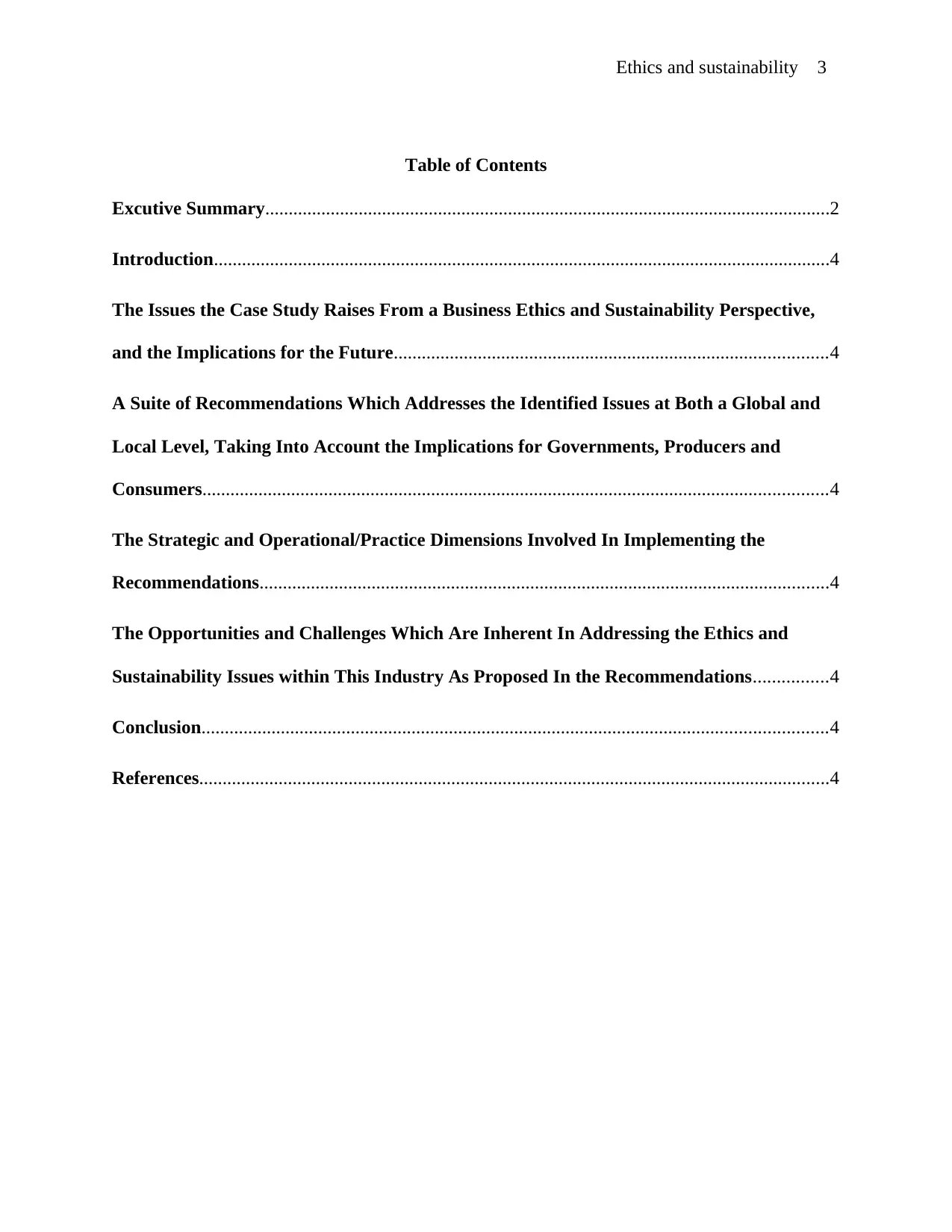
Ethics and sustainability 3
Table of Contents
Excutive Summary.........................................................................................................................2
Introduction....................................................................................................................................4
The Issues the Case Study Raises From a Business Ethics and Sustainability Perspective,
and the Implications for the Future.............................................................................................4
A Suite of Recommendations Which Addresses the Identified Issues at Both a Global and
Local Level, Taking Into Account the Implications for Governments, Producers and
Consumers......................................................................................................................................4
The Strategic and Operational/Practice Dimensions Involved In Implementing the
Recommendations..........................................................................................................................4
The Opportunities and Challenges Which Are Inherent In Addressing the Ethics and
Sustainability Issues within This Industry As Proposed In the Recommendations................4
Conclusion......................................................................................................................................4
References.......................................................................................................................................4
Table of Contents
Excutive Summary.........................................................................................................................2
Introduction....................................................................................................................................4
The Issues the Case Study Raises From a Business Ethics and Sustainability Perspective,
and the Implications for the Future.............................................................................................4
A Suite of Recommendations Which Addresses the Identified Issues at Both a Global and
Local Level, Taking Into Account the Implications for Governments, Producers and
Consumers......................................................................................................................................4
The Strategic and Operational/Practice Dimensions Involved In Implementing the
Recommendations..........................................................................................................................4
The Opportunities and Challenges Which Are Inherent In Addressing the Ethics and
Sustainability Issues within This Industry As Proposed In the Recommendations................4
Conclusion......................................................................................................................................4
References.......................................................................................................................................4
⊘ This is a preview!⊘
Do you want full access?
Subscribe today to unlock all pages.

Trusted by 1+ million students worldwide
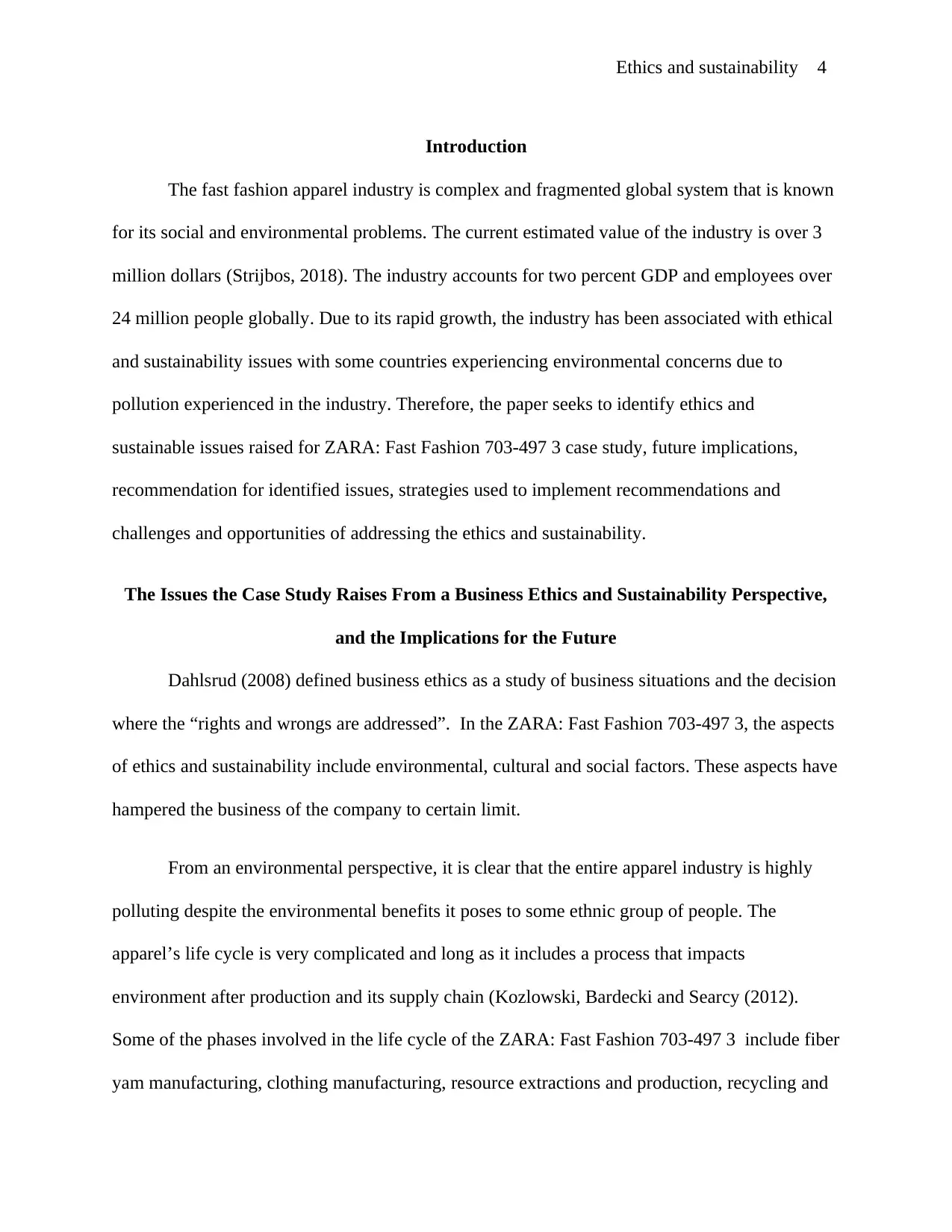
Ethics and sustainability 4
Introduction
The fast fashion apparel industry is complex and fragmented global system that is known
for its social and environmental problems. The current estimated value of the industry is over 3
million dollars (Strijbos, 2018). The industry accounts for two percent GDP and employees over
24 million people globally. Due to its rapid growth, the industry has been associated with ethical
and sustainability issues with some countries experiencing environmental concerns due to
pollution experienced in the industry. Therefore, the paper seeks to identify ethics and
sustainable issues raised for ZARA: Fast Fashion 703-497 3 case study, future implications,
recommendation for identified issues, strategies used to implement recommendations and
challenges and opportunities of addressing the ethics and sustainability.
The Issues the Case Study Raises From a Business Ethics and Sustainability Perspective,
and the Implications for the Future
Dahlsrud (2008) defined business ethics as a study of business situations and the decision
where the “rights and wrongs are addressed”. In the ZARA: Fast Fashion 703-497 3, the aspects
of ethics and sustainability include environmental, cultural and social factors. These aspects have
hampered the business of the company to certain limit.
From an environmental perspective, it is clear that the entire apparel industry is highly
polluting despite the environmental benefits it poses to some ethnic group of people. The
apparel’s life cycle is very complicated and long as it includes a process that impacts
environment after production and its supply chain (Kozlowski, Bardecki and Searcy (2012).
Some of the phases involved in the life cycle of the ZARA: Fast Fashion 703-497 3 include fiber
yam manufacturing, clothing manufacturing, resource extractions and production, recycling and
Introduction
The fast fashion apparel industry is complex and fragmented global system that is known
for its social and environmental problems. The current estimated value of the industry is over 3
million dollars (Strijbos, 2018). The industry accounts for two percent GDP and employees over
24 million people globally. Due to its rapid growth, the industry has been associated with ethical
and sustainability issues with some countries experiencing environmental concerns due to
pollution experienced in the industry. Therefore, the paper seeks to identify ethics and
sustainable issues raised for ZARA: Fast Fashion 703-497 3 case study, future implications,
recommendation for identified issues, strategies used to implement recommendations and
challenges and opportunities of addressing the ethics and sustainability.
The Issues the Case Study Raises From a Business Ethics and Sustainability Perspective,
and the Implications for the Future
Dahlsrud (2008) defined business ethics as a study of business situations and the decision
where the “rights and wrongs are addressed”. In the ZARA: Fast Fashion 703-497 3, the aspects
of ethics and sustainability include environmental, cultural and social factors. These aspects have
hampered the business of the company to certain limit.
From an environmental perspective, it is clear that the entire apparel industry is highly
polluting despite the environmental benefits it poses to some ethnic group of people. The
apparel’s life cycle is very complicated and long as it includes a process that impacts
environment after production and its supply chain (Kozlowski, Bardecki and Searcy (2012).
Some of the phases involved in the life cycle of the ZARA: Fast Fashion 703-497 3 include fiber
yam manufacturing, clothing manufacturing, resource extractions and production, recycling and
Paraphrase This Document
Need a fresh take? Get an instant paraphrase of this document with our AI Paraphraser
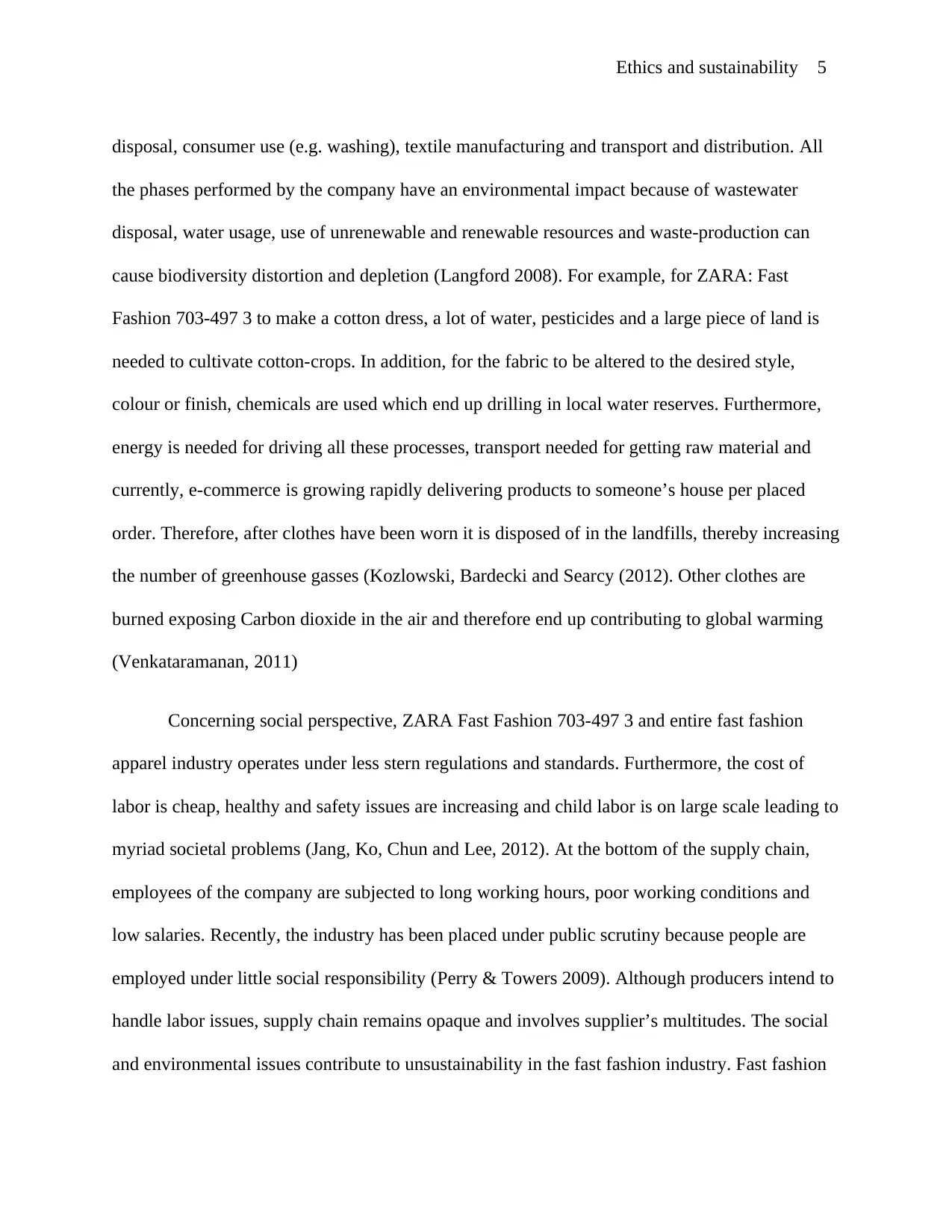
Ethics and sustainability 5
disposal, consumer use (e.g. washing), textile manufacturing and transport and distribution. All
the phases performed by the company have an environmental impact because of wastewater
disposal, water usage, use of unrenewable and renewable resources and waste-production can
cause biodiversity distortion and depletion (Langford 2008). For example, for ZARA: Fast
Fashion 703-497 3 to make a cotton dress, a lot of water, pesticides and a large piece of land is
needed to cultivate cotton-crops. In addition, for the fabric to be altered to the desired style,
colour or finish, chemicals are used which end up drilling in local water reserves. Furthermore,
energy is needed for driving all these processes, transport needed for getting raw material and
currently, e-commerce is growing rapidly delivering products to someone’s house per placed
order. Therefore, after clothes have been worn it is disposed of in the landfills, thereby increasing
the number of greenhouse gasses (Kozlowski, Bardecki and Searcy (2012). Other clothes are
burned exposing Carbon dioxide in the air and therefore end up contributing to global warming
(Venkataramanan, 2011)
Concerning social perspective, ZARA Fast Fashion 703-497 3 and entire fast fashion
apparel industry operates under less stern regulations and standards. Furthermore, the cost of
labor is cheap, healthy and safety issues are increasing and child labor is on large scale leading to
myriad societal problems (Jang, Ko, Chun and Lee, 2012). At the bottom of the supply chain,
employees of the company are subjected to long working hours, poor working conditions and
low salaries. Recently, the industry has been placed under public scrutiny because people are
employed under little social responsibility (Perry & Towers 2009). Although producers intend to
handle labor issues, supply chain remains opaque and involves supplier’s multitudes. The social
and environmental issues contribute to unsustainability in the fast fashion industry. Fast fashion
disposal, consumer use (e.g. washing), textile manufacturing and transport and distribution. All
the phases performed by the company have an environmental impact because of wastewater
disposal, water usage, use of unrenewable and renewable resources and waste-production can
cause biodiversity distortion and depletion (Langford 2008). For example, for ZARA: Fast
Fashion 703-497 3 to make a cotton dress, a lot of water, pesticides and a large piece of land is
needed to cultivate cotton-crops. In addition, for the fabric to be altered to the desired style,
colour or finish, chemicals are used which end up drilling in local water reserves. Furthermore,
energy is needed for driving all these processes, transport needed for getting raw material and
currently, e-commerce is growing rapidly delivering products to someone’s house per placed
order. Therefore, after clothes have been worn it is disposed of in the landfills, thereby increasing
the number of greenhouse gasses (Kozlowski, Bardecki and Searcy (2012). Other clothes are
burned exposing Carbon dioxide in the air and therefore end up contributing to global warming
(Venkataramanan, 2011)
Concerning social perspective, ZARA Fast Fashion 703-497 3 and entire fast fashion
apparel industry operates under less stern regulations and standards. Furthermore, the cost of
labor is cheap, healthy and safety issues are increasing and child labor is on large scale leading to
myriad societal problems (Jang, Ko, Chun and Lee, 2012). At the bottom of the supply chain,
employees of the company are subjected to long working hours, poor working conditions and
low salaries. Recently, the industry has been placed under public scrutiny because people are
employed under little social responsibility (Perry & Towers 2009). Although producers intend to
handle labor issues, supply chain remains opaque and involves supplier’s multitudes. The social
and environmental issues contribute to unsustainability in the fast fashion industry. Fast fashion
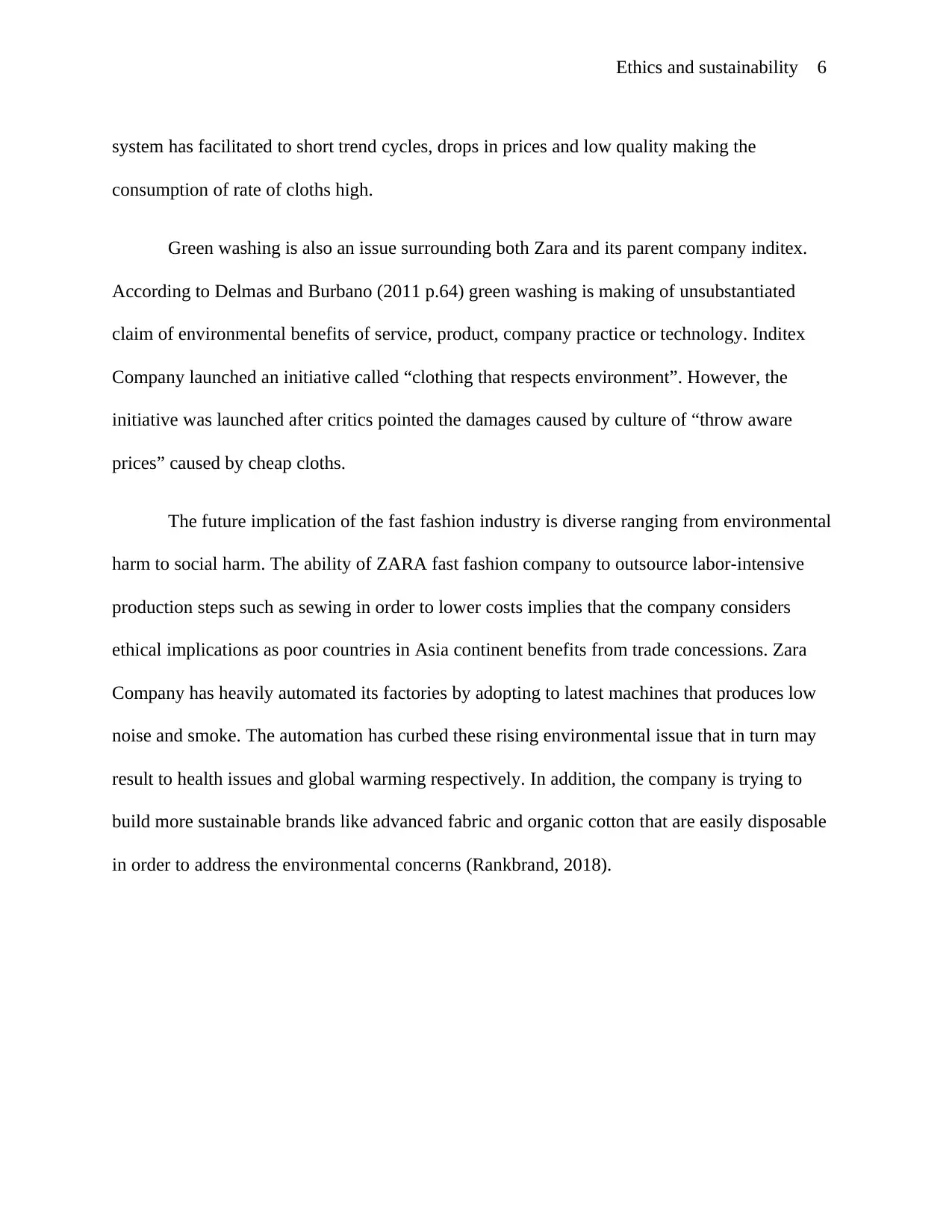
Ethics and sustainability 6
system has facilitated to short trend cycles, drops in prices and low quality making the
consumption of rate of cloths high.
Green washing is also an issue surrounding both Zara and its parent company inditex.
According to Delmas and Burbano (2011 p.64) green washing is making of unsubstantiated
claim of environmental benefits of service, product, company practice or technology. Inditex
Company launched an initiative called “clothing that respects environment”. However, the
initiative was launched after critics pointed the damages caused by culture of “throw aware
prices” caused by cheap cloths.
The future implication of the fast fashion industry is diverse ranging from environmental
harm to social harm. The ability of ZARA fast fashion company to outsource labor-intensive
production steps such as sewing in order to lower costs implies that the company considers
ethical implications as poor countries in Asia continent benefits from trade concessions. Zara
Company has heavily automated its factories by adopting to latest machines that produces low
noise and smoke. The automation has curbed these rising environmental issue that in turn may
result to health issues and global warming respectively. In addition, the company is trying to
build more sustainable brands like advanced fabric and organic cotton that are easily disposable
in order to address the environmental concerns (Rankbrand, 2018).
system has facilitated to short trend cycles, drops in prices and low quality making the
consumption of rate of cloths high.
Green washing is also an issue surrounding both Zara and its parent company inditex.
According to Delmas and Burbano (2011 p.64) green washing is making of unsubstantiated
claim of environmental benefits of service, product, company practice or technology. Inditex
Company launched an initiative called “clothing that respects environment”. However, the
initiative was launched after critics pointed the damages caused by culture of “throw aware
prices” caused by cheap cloths.
The future implication of the fast fashion industry is diverse ranging from environmental
harm to social harm. The ability of ZARA fast fashion company to outsource labor-intensive
production steps such as sewing in order to lower costs implies that the company considers
ethical implications as poor countries in Asia continent benefits from trade concessions. Zara
Company has heavily automated its factories by adopting to latest machines that produces low
noise and smoke. The automation has curbed these rising environmental issue that in turn may
result to health issues and global warming respectively. In addition, the company is trying to
build more sustainable brands like advanced fabric and organic cotton that are easily disposable
in order to address the environmental concerns (Rankbrand, 2018).
⊘ This is a preview!⊘
Do you want full access?
Subscribe today to unlock all pages.

Trusted by 1+ million students worldwide
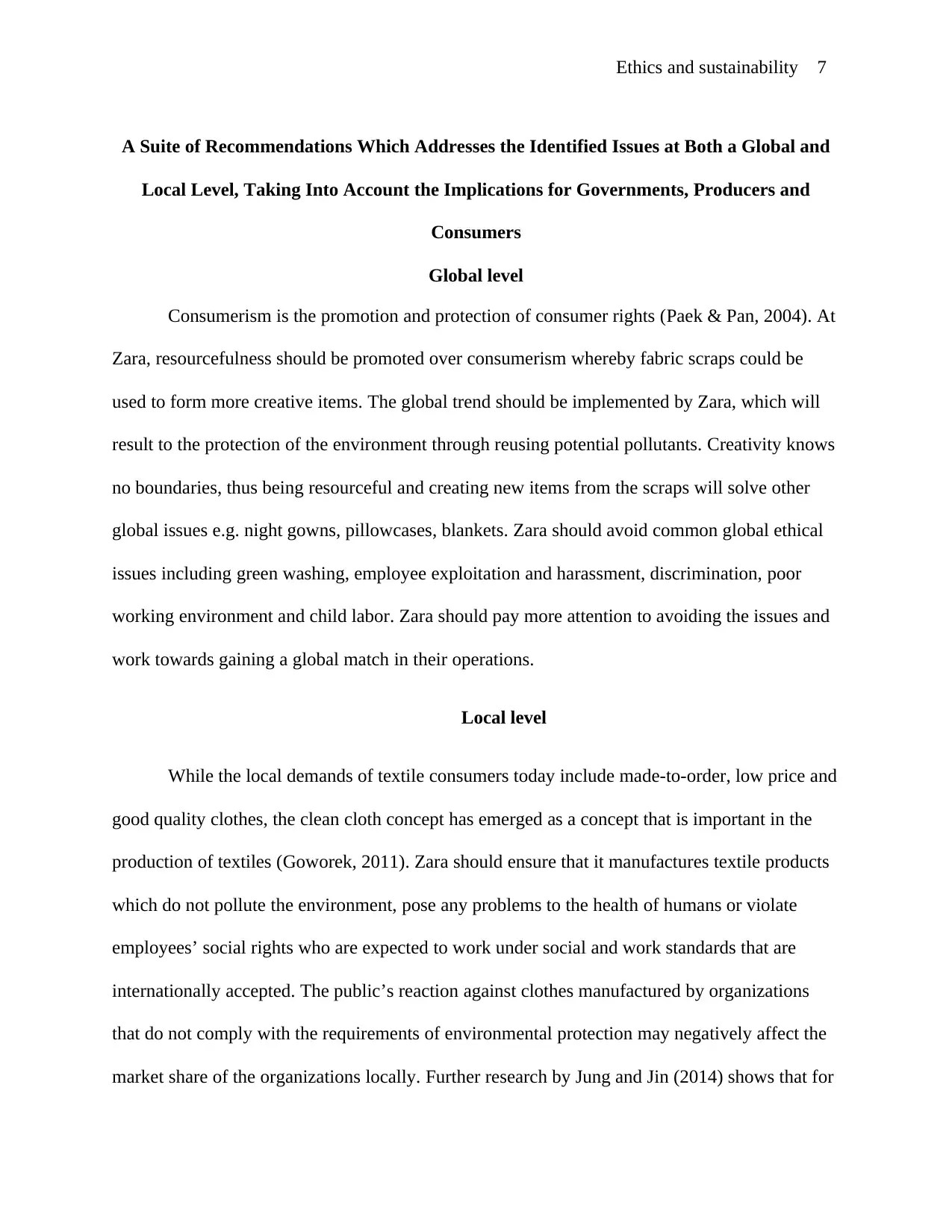
Ethics and sustainability 7
A Suite of Recommendations Which Addresses the Identified Issues at Both a Global and
Local Level, Taking Into Account the Implications for Governments, Producers and
Consumers
Global level
Consumerism is the promotion and protection of consumer rights (Paek & Pan, 2004). At
Zara, resourcefulness should be promoted over consumerism whereby fabric scraps could be
used to form more creative items. The global trend should be implemented by Zara, which will
result to the protection of the environment through reusing potential pollutants. Creativity knows
no boundaries, thus being resourceful and creating new items from the scraps will solve other
global issues e.g. night gowns, pillowcases, blankets. Zara should avoid common global ethical
issues including green washing, employee exploitation and harassment, discrimination, poor
working environment and child labor. Zara should pay more attention to avoiding the issues and
work towards gaining a global match in their operations.
Local level
While the local demands of textile consumers today include made-to-order, low price and
good quality clothes, the clean cloth concept has emerged as a concept that is important in the
production of textiles (Goworek, 2011). Zara should ensure that it manufactures textile products
which do not pollute the environment, pose any problems to the health of humans or violate
employees’ social rights who are expected to work under social and work standards that are
internationally accepted. The public’s reaction against clothes manufactured by organizations
that do not comply with the requirements of environmental protection may negatively affect the
market share of the organizations locally. Further research by Jung and Jin (2014) shows that for
A Suite of Recommendations Which Addresses the Identified Issues at Both a Global and
Local Level, Taking Into Account the Implications for Governments, Producers and
Consumers
Global level
Consumerism is the promotion and protection of consumer rights (Paek & Pan, 2004). At
Zara, resourcefulness should be promoted over consumerism whereby fabric scraps could be
used to form more creative items. The global trend should be implemented by Zara, which will
result to the protection of the environment through reusing potential pollutants. Creativity knows
no boundaries, thus being resourceful and creating new items from the scraps will solve other
global issues e.g. night gowns, pillowcases, blankets. Zara should avoid common global ethical
issues including green washing, employee exploitation and harassment, discrimination, poor
working environment and child labor. Zara should pay more attention to avoiding the issues and
work towards gaining a global match in their operations.
Local level
While the local demands of textile consumers today include made-to-order, low price and
good quality clothes, the clean cloth concept has emerged as a concept that is important in the
production of textiles (Goworek, 2011). Zara should ensure that it manufactures textile products
which do not pollute the environment, pose any problems to the health of humans or violate
employees’ social rights who are expected to work under social and work standards that are
internationally accepted. The public’s reaction against clothes manufactured by organizations
that do not comply with the requirements of environmental protection may negatively affect the
market share of the organizations locally. Further research by Jung and Jin (2014) shows that for
Paraphrase This Document
Need a fresh take? Get an instant paraphrase of this document with our AI Paraphraser
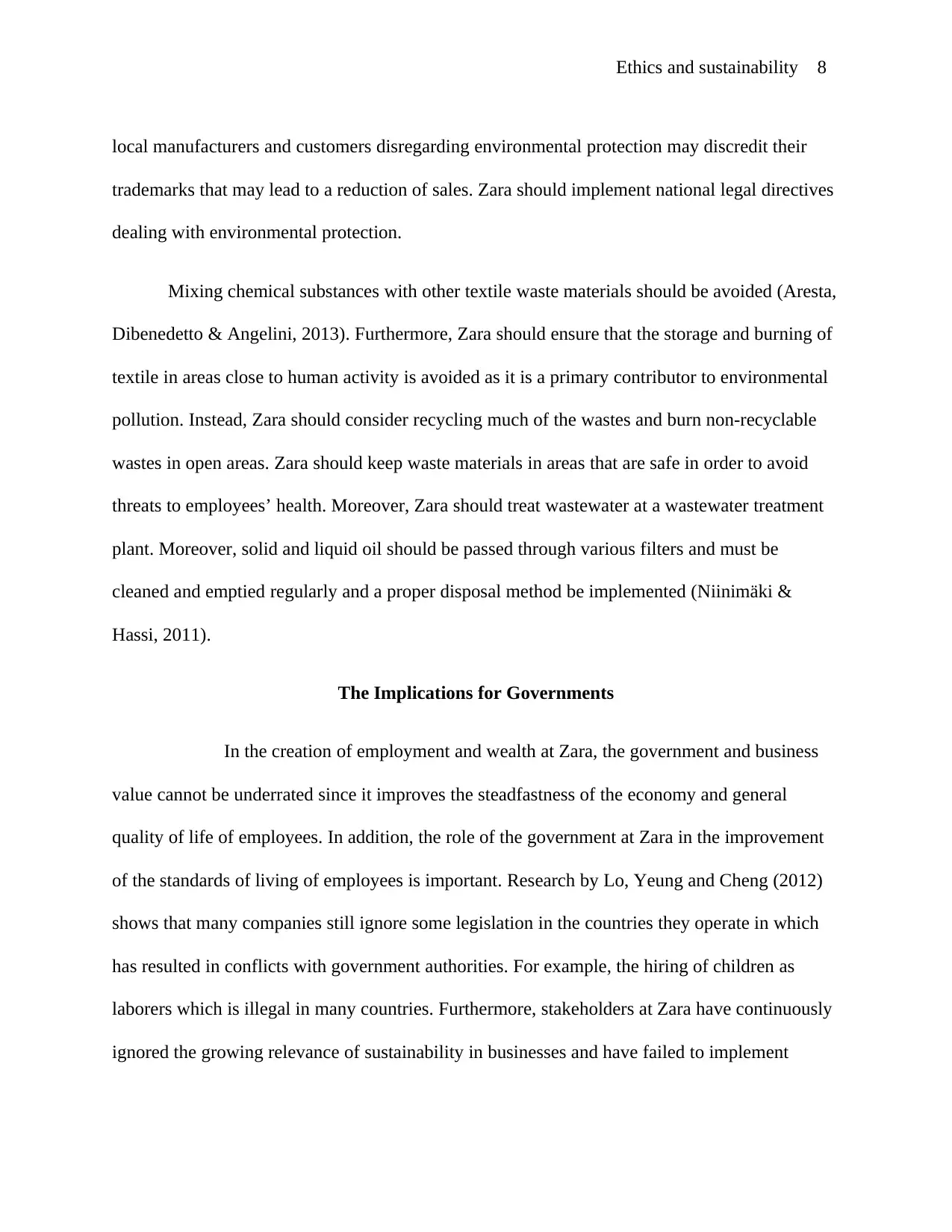
Ethics and sustainability 8
local manufacturers and customers disregarding environmental protection may discredit their
trademarks that may lead to a reduction of sales. Zara should implement national legal directives
dealing with environmental protection.
Mixing chemical substances with other textile waste materials should be avoided (Aresta,
Dibenedetto & Angelini, 2013). Furthermore, Zara should ensure that the storage and burning of
textile in areas close to human activity is avoided as it is a primary contributor to environmental
pollution. Instead, Zara should consider recycling much of the wastes and burn non-recyclable
wastes in open areas. Zara should keep waste materials in areas that are safe in order to avoid
threats to employees’ health. Moreover, Zara should treat wastewater at a wastewater treatment
plant. Moreover, solid and liquid oil should be passed through various filters and must be
cleaned and emptied regularly and a proper disposal method be implemented (Niinimäki &
Hassi, 2011).
The Implications for Governments
In the creation of employment and wealth at Zara, the government and business
value cannot be underrated since it improves the steadfastness of the economy and general
quality of life of employees. In addition, the role of the government at Zara in the improvement
of the standards of living of employees is important. Research by Lo, Yeung and Cheng (2012)
shows that many companies still ignore some legislation in the countries they operate in which
has resulted in conflicts with government authorities. For example, the hiring of children as
laborers which is illegal in many countries. Furthermore, stakeholders at Zara have continuously
ignored the growing relevance of sustainability in businesses and have failed to implement
local manufacturers and customers disregarding environmental protection may discredit their
trademarks that may lead to a reduction of sales. Zara should implement national legal directives
dealing with environmental protection.
Mixing chemical substances with other textile waste materials should be avoided (Aresta,
Dibenedetto & Angelini, 2013). Furthermore, Zara should ensure that the storage and burning of
textile in areas close to human activity is avoided as it is a primary contributor to environmental
pollution. Instead, Zara should consider recycling much of the wastes and burn non-recyclable
wastes in open areas. Zara should keep waste materials in areas that are safe in order to avoid
threats to employees’ health. Moreover, Zara should treat wastewater at a wastewater treatment
plant. Moreover, solid and liquid oil should be passed through various filters and must be
cleaned and emptied regularly and a proper disposal method be implemented (Niinimäki &
Hassi, 2011).
The Implications for Governments
In the creation of employment and wealth at Zara, the government and business
value cannot be underrated since it improves the steadfastness of the economy and general
quality of life of employees. In addition, the role of the government at Zara in the improvement
of the standards of living of employees is important. Research by Lo, Yeung and Cheng (2012)
shows that many companies still ignore some legislation in the countries they operate in which
has resulted in conflicts with government authorities. For example, the hiring of children as
laborers which is illegal in many countries. Furthermore, stakeholders at Zara have continuously
ignored the growing relevance of sustainability in businesses and have failed to implement
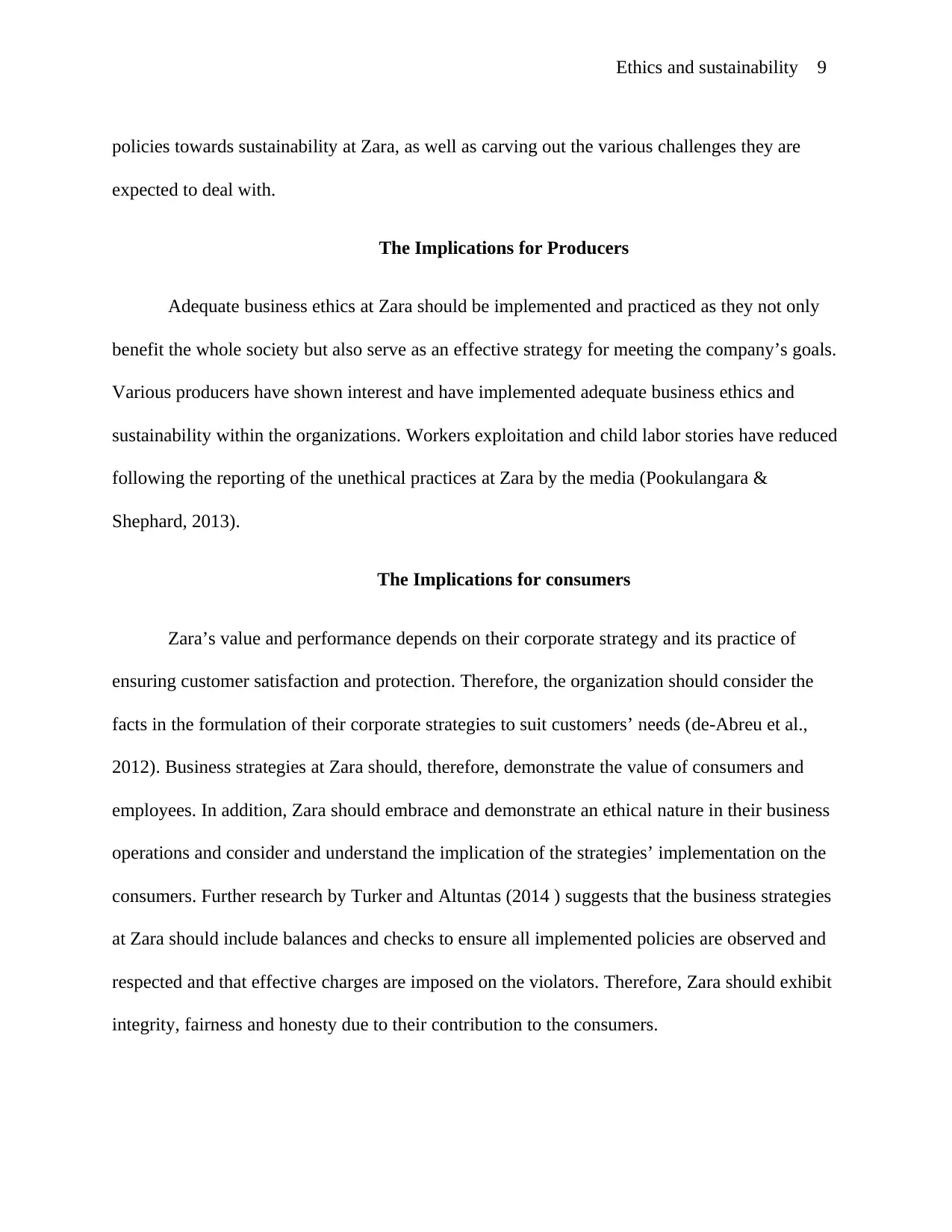
Ethics and sustainability 9
policies towards sustainability at Zara, as well as carving out the various challenges they are
expected to deal with.
The Implications for Producers
Adequate business ethics at Zara should be implemented and practiced as they not only
benefit the whole society but also serve as an effective strategy for meeting the company’s goals.
Various producers have shown interest and have implemented adequate business ethics and
sustainability within the organizations. Workers exploitation and child labor stories have reduced
following the reporting of the unethical practices at Zara by the media (Pookulangara &
Shephard, 2013).
The Implications for consumers
Zara’s value and performance depends on their corporate strategy and its practice of
ensuring customer satisfaction and protection. Therefore, the organization should consider the
facts in the formulation of their corporate strategies to suit customers’ needs (de-Abreu et al.,
2012). Business strategies at Zara should, therefore, demonstrate the value of consumers and
employees. In addition, Zara should embrace and demonstrate an ethical nature in their business
operations and consider and understand the implication of the strategies’ implementation on the
consumers. Further research by Turker and Altuntas (2014 ) suggests that the business strategies
at Zara should include balances and checks to ensure all implemented policies are observed and
respected and that effective charges are imposed on the violators. Therefore, Zara should exhibit
integrity, fairness and honesty due to their contribution to the consumers.
policies towards sustainability at Zara, as well as carving out the various challenges they are
expected to deal with.
The Implications for Producers
Adequate business ethics at Zara should be implemented and practiced as they not only
benefit the whole society but also serve as an effective strategy for meeting the company’s goals.
Various producers have shown interest and have implemented adequate business ethics and
sustainability within the organizations. Workers exploitation and child labor stories have reduced
following the reporting of the unethical practices at Zara by the media (Pookulangara &
Shephard, 2013).
The Implications for consumers
Zara’s value and performance depends on their corporate strategy and its practice of
ensuring customer satisfaction and protection. Therefore, the organization should consider the
facts in the formulation of their corporate strategies to suit customers’ needs (de-Abreu et al.,
2012). Business strategies at Zara should, therefore, demonstrate the value of consumers and
employees. In addition, Zara should embrace and demonstrate an ethical nature in their business
operations and consider and understand the implication of the strategies’ implementation on the
consumers. Further research by Turker and Altuntas (2014 ) suggests that the business strategies
at Zara should include balances and checks to ensure all implemented policies are observed and
respected and that effective charges are imposed on the violators. Therefore, Zara should exhibit
integrity, fairness and honesty due to their contribution to the consumers.
⊘ This is a preview!⊘
Do you want full access?
Subscribe today to unlock all pages.

Trusted by 1+ million students worldwide
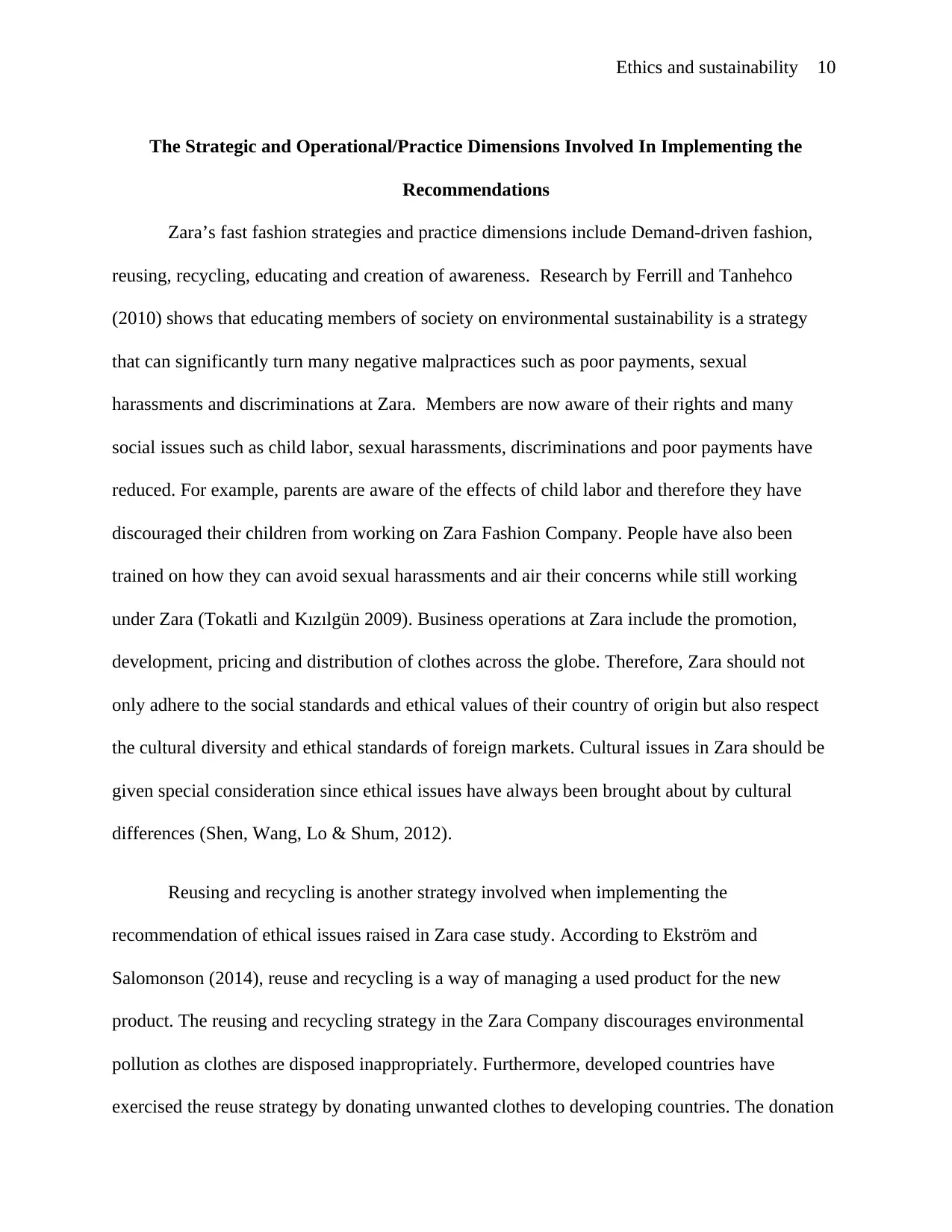
Ethics and sustainability 10
The Strategic and Operational/Practice Dimensions Involved In Implementing the
Recommendations
Zara’s fast fashion strategies and practice dimensions include Demand-driven fashion,
reusing, recycling, educating and creation of awareness. Research by Ferrill and Tanhehco
(2010) shows that educating members of society on environmental sustainability is a strategy
that can significantly turn many negative malpractices such as poor payments, sexual
harassments and discriminations at Zara. Members are now aware of their rights and many
social issues such as child labor, sexual harassments, discriminations and poor payments have
reduced. For example, parents are aware of the effects of child labor and therefore they have
discouraged their children from working on Zara Fashion Company. People have also been
trained on how they can avoid sexual harassments and air their concerns while still working
under Zara (Tokatli and Kızılgün 2009). Business operations at Zara include the promotion,
development, pricing and distribution of clothes across the globe. Therefore, Zara should not
only adhere to the social standards and ethical values of their country of origin but also respect
the cultural diversity and ethical standards of foreign markets. Cultural issues in Zara should be
given special consideration since ethical issues have always been brought about by cultural
differences (Shen, Wang, Lo & Shum, 2012).
Reusing and recycling is another strategy involved when implementing the
recommendation of ethical issues raised in Zara case study. According to Ekström and
Salomonson (2014), reuse and recycling is a way of managing a used product for the new
product. The reusing and recycling strategy in the Zara Company discourages environmental
pollution as clothes are disposed inappropriately. Furthermore, developed countries have
exercised the reuse strategy by donating unwanted clothes to developing countries. The donation
The Strategic and Operational/Practice Dimensions Involved In Implementing the
Recommendations
Zara’s fast fashion strategies and practice dimensions include Demand-driven fashion,
reusing, recycling, educating and creation of awareness. Research by Ferrill and Tanhehco
(2010) shows that educating members of society on environmental sustainability is a strategy
that can significantly turn many negative malpractices such as poor payments, sexual
harassments and discriminations at Zara. Members are now aware of their rights and many
social issues such as child labor, sexual harassments, discriminations and poor payments have
reduced. For example, parents are aware of the effects of child labor and therefore they have
discouraged their children from working on Zara Fashion Company. People have also been
trained on how they can avoid sexual harassments and air their concerns while still working
under Zara (Tokatli and Kızılgün 2009). Business operations at Zara include the promotion,
development, pricing and distribution of clothes across the globe. Therefore, Zara should not
only adhere to the social standards and ethical values of their country of origin but also respect
the cultural diversity and ethical standards of foreign markets. Cultural issues in Zara should be
given special consideration since ethical issues have always been brought about by cultural
differences (Shen, Wang, Lo & Shum, 2012).
Reusing and recycling is another strategy involved when implementing the
recommendation of ethical issues raised in Zara case study. According to Ekström and
Salomonson (2014), reuse and recycling is a way of managing a used product for the new
product. The reusing and recycling strategy in the Zara Company discourages environmental
pollution as clothes are disposed inappropriately. Furthermore, developed countries have
exercised the reuse strategy by donating unwanted clothes to developing countries. The donation
Paraphrase This Document
Need a fresh take? Get an instant paraphrase of this document with our AI Paraphraser
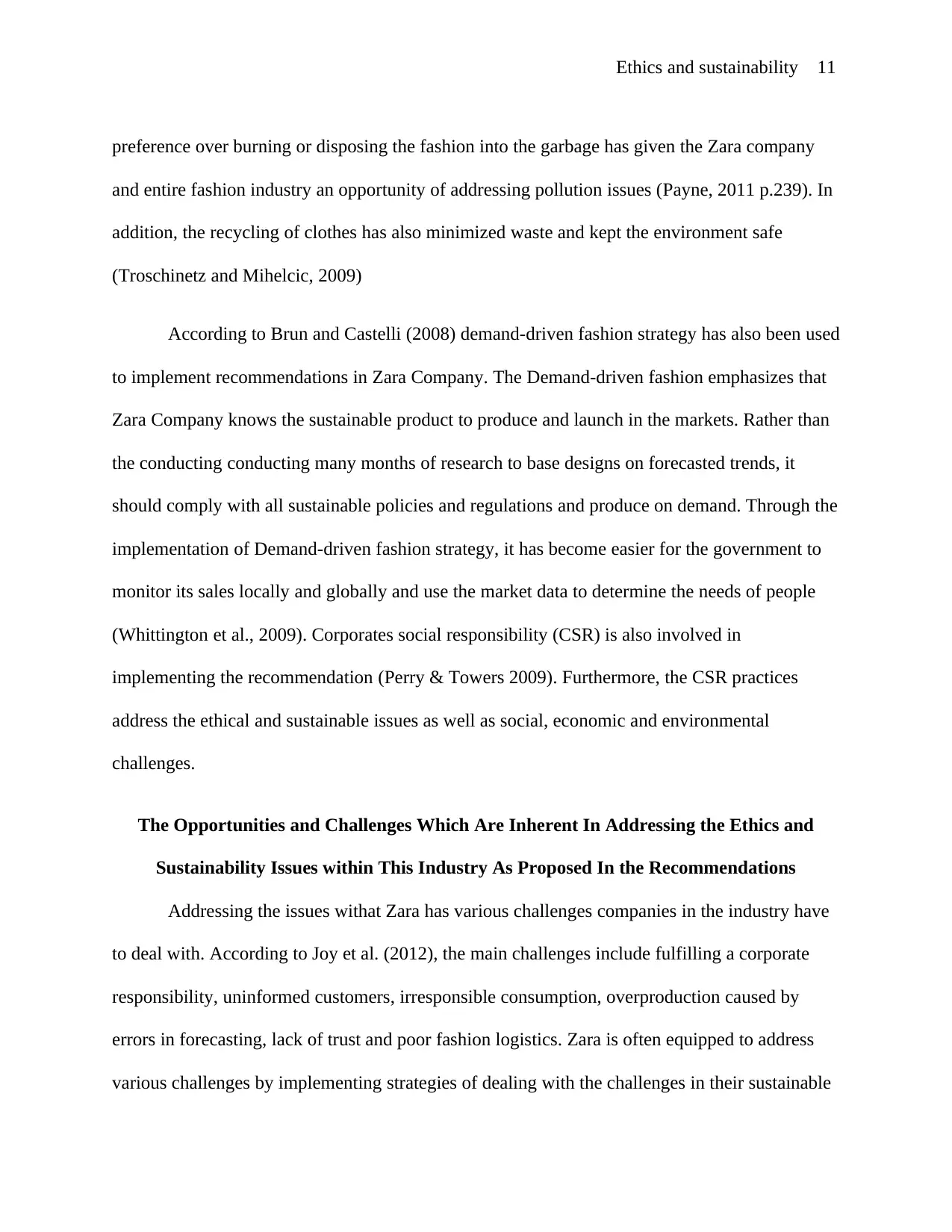
Ethics and sustainability 11
preference over burning or disposing the fashion into the garbage has given the Zara company
and entire fashion industry an opportunity of addressing pollution issues (Payne, 2011 p.239). In
addition, the recycling of clothes has also minimized waste and kept the environment safe
(Troschinetz and Mihelcic, 2009)
According to Brun and Castelli (2008) demand-driven fashion strategy has also been used
to implement recommendations in Zara Company. The Demand-driven fashion emphasizes that
Zara Company knows the sustainable product to produce and launch in the markets. Rather than
the conducting conducting many months of research to base designs on forecasted trends, it
should comply with all sustainable policies and regulations and produce on demand. Through the
implementation of Demand-driven fashion strategy, it has become easier for the government to
monitor its sales locally and globally and use the market data to determine the needs of people
(Whittington et al., 2009). Corporates social responsibility (CSR) is also involved in
implementing the recommendation (Perry & Towers 2009). Furthermore, the CSR practices
address the ethical and sustainable issues as well as social, economic and environmental
challenges.
The Opportunities and Challenges Which Are Inherent In Addressing the Ethics and
Sustainability Issues within This Industry As Proposed In the Recommendations
Addressing the issues withat Zara has various challenges companies in the industry have
to deal with. According to Joy et al. (2012), the main challenges include fulfilling a corporate
responsibility, uninformed customers, irresponsible consumption, overproduction caused by
errors in forecasting, lack of trust and poor fashion logistics. Zara is often equipped to address
various challenges by implementing strategies of dealing with the challenges in their sustainable
preference over burning or disposing the fashion into the garbage has given the Zara company
and entire fashion industry an opportunity of addressing pollution issues (Payne, 2011 p.239). In
addition, the recycling of clothes has also minimized waste and kept the environment safe
(Troschinetz and Mihelcic, 2009)
According to Brun and Castelli (2008) demand-driven fashion strategy has also been used
to implement recommendations in Zara Company. The Demand-driven fashion emphasizes that
Zara Company knows the sustainable product to produce and launch in the markets. Rather than
the conducting conducting many months of research to base designs on forecasted trends, it
should comply with all sustainable policies and regulations and produce on demand. Through the
implementation of Demand-driven fashion strategy, it has become easier for the government to
monitor its sales locally and globally and use the market data to determine the needs of people
(Whittington et al., 2009). Corporates social responsibility (CSR) is also involved in
implementing the recommendation (Perry & Towers 2009). Furthermore, the CSR practices
address the ethical and sustainable issues as well as social, economic and environmental
challenges.
The Opportunities and Challenges Which Are Inherent In Addressing the Ethics and
Sustainability Issues within This Industry As Proposed In the Recommendations
Addressing the issues withat Zara has various challenges companies in the industry have
to deal with. According to Joy et al. (2012), the main challenges include fulfilling a corporate
responsibility, uninformed customers, irresponsible consumption, overproduction caused by
errors in forecasting, lack of trust and poor fashion logistics. Zara is often equipped to address
various challenges by implementing strategies of dealing with the challenges in their sustainable
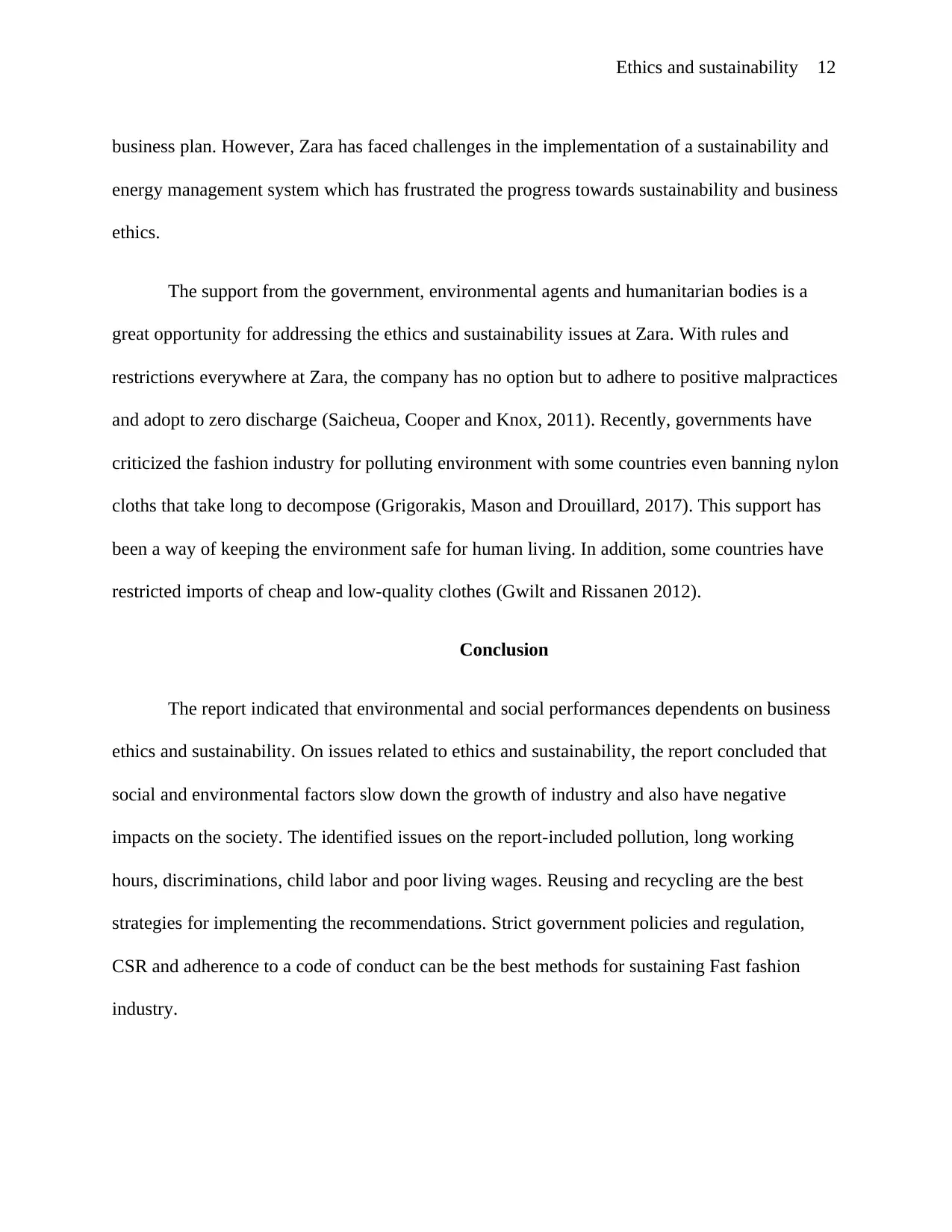
Ethics and sustainability 12
business plan. However, Zara has faced challenges in the implementation of a sustainability and
energy management system which has frustrated the progress towards sustainability and business
ethics.
The support from the government, environmental agents and humanitarian bodies is a
great opportunity for addressing the ethics and sustainability issues at Zara. With rules and
restrictions everywhere at Zara, the company has no option but to adhere to positive malpractices
and adopt to zero discharge (Saicheua, Cooper and Knox, 2011). Recently, governments have
criticized the fashion industry for polluting environment with some countries even banning nylon
cloths that take long to decompose (Grigorakis, Mason and Drouillard, 2017). This support has
been a way of keeping the environment safe for human living. In addition, some countries have
restricted imports of cheap and low-quality clothes (Gwilt and Rissanen 2012).
Conclusion
The report indicated that environmental and social performances dependents on business
ethics and sustainability. On issues related to ethics and sustainability, the report concluded that
social and environmental factors slow down the growth of industry and also have negative
impacts on the society. The identified issues on the report-included pollution, long working
hours, discriminations, child labor and poor living wages. Reusing and recycling are the best
strategies for implementing the recommendations. Strict government policies and regulation,
CSR and adherence to a code of conduct can be the best methods for sustaining Fast fashion
industry.
business plan. However, Zara has faced challenges in the implementation of a sustainability and
energy management system which has frustrated the progress towards sustainability and business
ethics.
The support from the government, environmental agents and humanitarian bodies is a
great opportunity for addressing the ethics and sustainability issues at Zara. With rules and
restrictions everywhere at Zara, the company has no option but to adhere to positive malpractices
and adopt to zero discharge (Saicheua, Cooper and Knox, 2011). Recently, governments have
criticized the fashion industry for polluting environment with some countries even banning nylon
cloths that take long to decompose (Grigorakis, Mason and Drouillard, 2017). This support has
been a way of keeping the environment safe for human living. In addition, some countries have
restricted imports of cheap and low-quality clothes (Gwilt and Rissanen 2012).
Conclusion
The report indicated that environmental and social performances dependents on business
ethics and sustainability. On issues related to ethics and sustainability, the report concluded that
social and environmental factors slow down the growth of industry and also have negative
impacts on the society. The identified issues on the report-included pollution, long working
hours, discriminations, child labor and poor living wages. Reusing and recycling are the best
strategies for implementing the recommendations. Strict government policies and regulation,
CSR and adherence to a code of conduct can be the best methods for sustaining Fast fashion
industry.
⊘ This is a preview!⊘
Do you want full access?
Subscribe today to unlock all pages.

Trusted by 1+ million students worldwide
1 out of 17
Related Documents
Your All-in-One AI-Powered Toolkit for Academic Success.
+13062052269
info@desklib.com
Available 24*7 on WhatsApp / Email
![[object Object]](/_next/static/media/star-bottom.7253800d.svg)
Unlock your academic potential
Copyright © 2020–2026 A2Z Services. All Rights Reserved. Developed and managed by ZUCOL.





